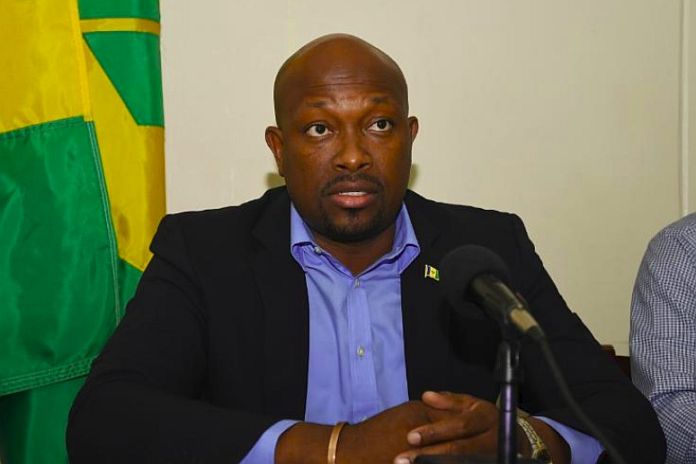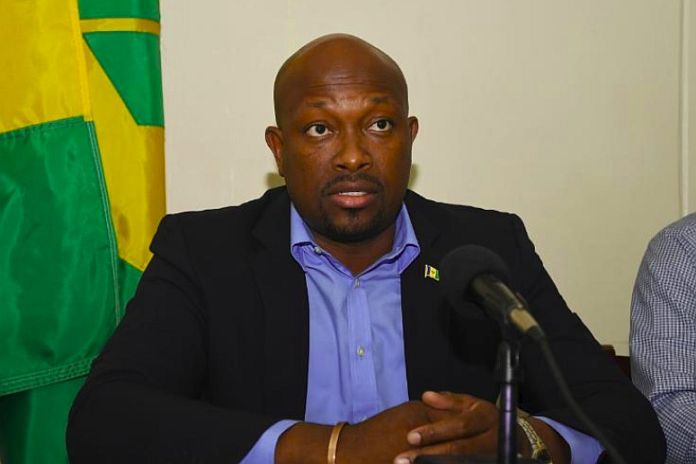Caribbean Regional Fisheries Mechanism elects new chairman


BELIZE, CITY, Belize — The newly elected chair of the Ministerial Council of the Caribbean Regional Fisheries Mechanism (CRFM) Saboto S. Caesar, minister of agriculture, rural transformation, forestry and fisheries of St Vincent and the Grenadines, has urged fellow ministers responsible for fisheries across the Caribbean to prioritize the Blue Economy as the region seeks to strengthen COVID-19 recovery efforts.
The ‘Blue Economy’ is an emerging concept which encourages better use and conservation of the ocean or ‘blue’ resources to boost economic growth and to tackle unemployment, food security and poverty.
The Ministerial Council has been forced to meet virtually since the start of the COVID-19 pandemic, but that has not stopped them from making monumental progress in steering the fisheries and aquaculture sector forward, with carefully designed policies and plans, despite very challenging times.
Minister Caesar, who was elected as chair of the CRFM Ministerial Council on Friday, May 21, 2021, to succeed minister Ezechiel Joseph of Saint Lucia, has assumed leadership with a resolute commitment, even as his home country is striving to overcome double tragedy, with the recent eruption of La Soufrière volcano amid the ongoing COVID-19 pandemic. Minister Caesar has held the position of minister of fisheries in St Vincent and the Grenadines for over a decade and is a lawyer by profession.
Prior to the pandemic and the explosive volcanic eruptions of 2021, St Vincent and the Grenadines stood out among the countries that were registering significant improvements in the export trade of its fisheries commodities. Although some CRFM Member States have been seeing declining exports coupled with a growing import bill to meet domestic demand for fish and fishery products, St Vincent and the Grenadines continued to register growth in trade for 2019 and 2020.
During the recent CRFM Ministerial Council meeting, the ministers received the latest updates on status and trends in fisheries and aquaculture, as documented in the “CRFM Statistics and Information Report 2019/2020,” which the ministers have endorsed for publication. The evidence provided in the report demonstrated that the COVID-19 pandemic has had a negative impact on activities in the fisheries sector, including production, as well as exports and imports of fish and fishery products.
These impacts were documented in even more detail through regional assessments which the CRFM Secretariat conducted during 2020 and 2021, aimed at providing insights to support the reorientation of the fisheries and aquaculture sector. Member States will convene follow-up meetings to advance post-COVID-19 response and recovery, in line with the CARICOM COVID-19 Agri-Food Action Plan and Risk Management Framework.
The CRFM is involved in several initiatives to help Member States address the myriad challenges that confront them, and these initiatives have integrated elements to address and mitigate COVID-19 impacts, as well as a prior mandate of the Ministerial Council to address gender, youth, and decent in all CRFM policies, protocols, programmes, and plans. At their meeting last week, the ministers also approved the Gender Analysis, Strategy and Action Plan on Gender Mainstreaming in Fisheries for the CRFM countries, which the CRFM developed through a recently concluded project funded by Global Affairs Canada in collaboration with UNDP/ GEF supported Flyingfish Sub-project of the CLME+ Project.
The ministers also welcomed and expressed their support for the Copenhagen Declaration on Transnational Organized Crime in the Global Fishing Industry and the Blue Justice Initiative established with Norwegian support to help countries (particularly developing countries) to work together and build their capacity to prevent, deter and eradicate IUU fishing and transnational organized crime in the global fishing industry.
Other initiatives considered by the meeting include the ‘Sargassum Products for Climate Resilience in the Caribbean’ 3-year initiative, funded by New Zealand, which will explore the potential opportunities for countries to generate revenue from high-end products to be made from Sargassum; the proposed GEF/Development Bank of Latin American/ FAO ‘Caribbean Blue Economy Project entitled, Promoting National Blue Economy Priorities Through Marine Spatial Planning in the Caribbean Large Marine Ecosystem Plus (BE-CLME+ Project); the Japan-funded COASTFISH project, which will advance co-management of coastal fisheries; as well as the recently launched EU-funded sanitary and phytosanitary systems project aimed at addressing quality control and safety of fish exports and imports, and which is expected to help drive an important engine for economic growth through increased international trade opportunities.
The meeting further agreed on approaches to ensure that CARICOM States are prepared to meet the requirements of the USA Marine Mammals Act which will take effect in 2022 and avoid interruption in flow of fish and fishery products to the US market. Finally, the meeting discussed and provided guidance on the ongoing World Trade Organization initiative to conclude a legally binding agreement to prohibit harmful subsidies that contribute to IUU fishing and overfishing, as well as the Intergovernmental Conference, under the auspices of the United Nations, to elaborate the text of an international legally binding instrument under the United Nations Convention on the Law of Sea on the conservation and sustainable use of marine biological diversity of areas beyond national jurisdiction.
The executive director of the CRFM, Milton Haughton, said:
“The 15 meeting of the Ministerial Council of the CRFM was a very productive and successful meeting with extremely useful and informed contributions from policy makers and senior officials from across the region. The level of engagement and enthusiasm of policymakers confirmed that there is a bright future for fisheries and aquaculture in the post-covid-19 economic recovery and food security of the Caribbean region.”
The Regional Fisheries Ministers are due to meet again in October 2021 for their 11th Special Meeting, when they are expected to, among other things, consider a Resource Mobilization Strategy, a Remote Work Policy and the Third CRFM Strategic Plan, to chart the way forward for the next 8 years (2022-2030). The CRFM has committed to involving stakeholders from all 17 Member States and international development partners in crafting a plan that will give life to the collective vision and aspiration of the people across the region.
Source: caribbeannewsglobal.com


